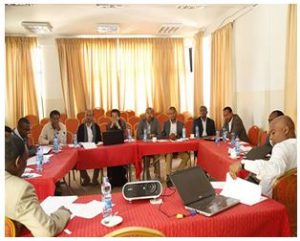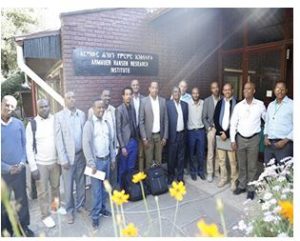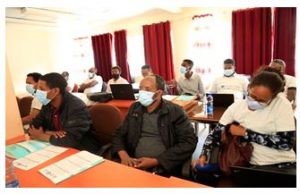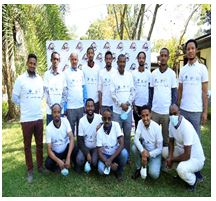Clinical Research Network
Clinical Research Network (CRN)
- About CRN
- Research
- Publication
- Ongoing Studies
- Graduate Student
- Contact
About the CRN Initiative
Clinical research involves research conducted to support improvement and generation of new knowledge to prevent, diagnose, treat, and understand human diseases. Cognizant of this fact, the Armauer Hansen Research Institute (AHRI) initiated the Clinical Research Network (CRN) in January 2015 with funding from the Federal Ministry of Health (FMoHE) to conduct a series of clinical research studies in multiple regions in the country. The initial CRN collaboration has been commenced with five local universities (Addis Ababa, Jimma, Gondar, Haramaya and Hawasa Universities) on selected research areas with a fund received from the FMoHE. To expand the network, AHRI signed memorandum of understanding with additional six local universities (Arba Minch, Mekele, Debere Markos, Debere Berhan, Arsi and St. Paul Hospital Millennium Medical College) in December 2018. Therefore, AHRI is currently collaborating with 11 local universities to improve clinical research capacity through research endeavors in the country.
Objectives
Objectives of the CRN initiative includes capacity building (laboratory development/upgrading and training at the MSc and PhD levels) in CRN affiliated local universities and to generate evidence to provide local solutions for specific key local health care challenges through conducting need-based research.
Partial view: Meeting of Clinical Research Network, 10 January 2019
World Antimicrobial Awareness Week Celebration at AHRI: 19 November 20
Research Focus
Antimicrobial Resistance; Viral hepatitis; Cancer and Arboviral diseases are the four focus areas of this CRN imitative. These health challenges are selected considering limited availability of local data (evidence) and they are also among top prioritized disease problems in the country (HSTP II) causing serious health and economic consequences. In all the projects, post graduate students (MSc/PhD) are involved by collecting specimens from multiple sites within the network.
Publication
Publications through the support of the initiative
Antimicrobial Resistance
2019
- Synopsis: Investigations on antimicrobial resistance: contributions of a clinical research network. Abraham Aseffa, Ebba Abate, Berhanu Seyoum, Tesfaye Kassa, Tamrat Abebe Anteneh Amsalu, Abebaw Bitew, Tsegaye Alemayehu, Zeleke Ayenew, Zeleke Gizachew, Daniel Demissie, Sebsib Neway, Biruk Yeshitila, Andargachew Mulu, Adane Mihret, Taye Balcha, Rawleigh Howe. Ethiop Med J, 2019, Supp. 1.
- Bacterial profile, antibacterial susceptibility pattern and as-sociated factors among women attending antenatal and post-natal health services at the university of Gondar teaching hospital, northwest Ethiopia. Abebaw Bitew, Birhanemeskel Tegene, Biruk Yeshitila, Rawleigh Howe, Ebba Abate, Mulat Dagnew. Ethiop Med J, 2019, Supp. 1.
- Septicemia, bacterial isolates and drug susceptibility among women attending delivery at Dilchora hospital, Dire Dawa, eastern Ethiopia. Daniel Demissie, Berhanu Seyoum, Melake Demena, Biruk Yeshitila. Ethiop Med J, 2019, Supp. 1.
- Multidrug resistant bacteria and associated factors among re-productive age women with significant bacteriuria in Jimma, northwest Ethiopia. Zeleke Gizachew, Tesfaye Kassa, Getnet Beyene, Rawleigh Howe, Biruk Yeshitila. Ethiop Med J, 2019, Supp. 1.
- High burden of nosocomial infections caused by multidrug re-sistant pathogens in pediatric patients at Hawassa University comprehensive specialized hospital. Tsegaye Alemayehu, Endale Tadesse, Sosina Ayalew, Bezaye Nigusse, Biruk Yeshitila, Anteneh Amsalu, Abraham Aseffa. Ethiop Med J, 2019, Supp. 1.
- Enteric pathogens and antimicrobial susceptibility profile among pediatric patients with diarrhea in Addis Ababa, Ethiopia. Zeleke Ayenew, Habtamu Biazn, Solomon Gebre Selassie, Biruk Yeshitila, Adane Mihret, Tamrat Abebe. Ethiop Med J, 2019, Supp. 1.
Viral hepatitis
2020:
Occult Hepatitis B virus infection among HIV negative and positive isolated anti‑HBc individuals in eastern Ethiopia. Desalegn Admassu Ayana, A. Mulu, A. Mihret, B. Seyoum, A. Aseffa & R. Howe. Scientific Reports | (2020) 10:22182 | https://doi.org/10.1038/s41598-020-79392-x
2019:
- Exploring the impact of childhood HBV vaccination in Ethiopia: a synopsis and discussion of preliminary findings. Rawleigh Howe, Ebba Abate, Berhanu Seyoum, Tesfaye Kassa, Tamrat Abebe, Seifegebriel Teshome, Habtamu Biazin, Getnet Ayalew, Mekuanint Geta, Rebie Kedir, Belayneh Dimah, Fitsum Abebe, Seifudin Usman, Andargachew Mulu, Adane Mihret, Taye Tolera Balcha, Abraham Aseffa, Ethiop Med J, 2019, Supp. 2.
- Sero prevalence of HBV infection & associated factors among mothers in Gondar, North west Ethiopia. Mekuanint Geta, Getenet Ayalew, Endalew Yizengaw, Adane Mihret, Abraham aseffa, Rawliegh Howe, Feleke Moges, Ebba Abate. Ethiop Med J, 2019, Supp. 2.
- Sero prevalence and associated factors for hepatitis B virus & C infections among mothers in Western Ethiopia, Jimma, Ethiopia: a community-based study. Belayneh Dimah, esfaye Kassa, Luel Teshager, Rebie kedir, Addisu Gize, Abraham Aseffa, Rawliegh Howe ,Adane Mihret. Ethiop Med J, 2019, Supp. 2.
- Sero-prevalence of hepatitis B virus surface antigen, anti-hepatitis C virus antibody and their associated factors among mothers living in Harar, eastern Ethiopia. Fitsum Abebe, Berhanu Seyoum, Zelalem Teklemariam, Lemessa Oljira, Azeb Tarekegne, Fikre Bekele, Adane Mihret. Abraham Aseffa, Rawliegh Howe. Ethiop Med J, 2019, Supp. 2.
- Sero prevalence and risk factors for hepatitis B virus infections among healthy mothers in Addis Ababa City Administration, Ethiopia. Habtamu Biazin, Seifegebriel Teshome, Tamrat Abebe, Adane Mihret. Abraham Aseffa, Rawliegh Howe. Ethiop Med J, 2019, Supp. 2.
- Immune protection of HBV among children living in Gondar, North west Ethiopia. Getnet Ayalew, Abate Assefa, Anteneh Amsalu, Mekuaninet Geta, Adane Mihret. Abraham Aseffa, Rawliegh Howe, Ebba Abate. Ethiop Med J, 2019, Supp. 2.
- Sero prevalence of Hepatitis B Virus Infections & sero protection HBV vaccine among children in Jimma Town, Southwest Ethiopia. Rebie kedir, Belayneh Dimah, Tesfaye Kassa, Luel teshager,.Abraham Aseffa, Rawliegh Howe, Adane Mihret, Addisu Gezie. Ethiop Med J, 2019, Supp. 2.
- Serum level of anti-hepatitis b surface antigen and HBV associated factors among vaccinated and unvaccinated children in Harar, eastern Ethiopia: A community-based study. Seifudin Usman, Berhanu Seyoum, Bezatu Mengiste, Azeb Tarekegne, Fiker Bekele, Adane Mihret. Abraham Aseffa, Rawliegh Howe. Ethiop Med J, 2019, Supp. 2.
- Antibody level against HBV after Hepatitis B vaccination and Sero-prevalence of HBV in children, Addis Ababa, Ethiopia. Seifegebriel Teshome, Habtamu Biazin, Azeb Tarekegne, Tamrat Abebe, Fiker Bekele, Adane Mihret. Abraham Aseffa, Rawliegh Howe. Ethiop Med J, 2019, Supp. 2.
- Hepatitis B virus seromarkers among HIV infected adults on ART: An unmet need for HBV screening in eastern Ethiopia. Desalegn Admassu Ayana, Andargachew Mulu, Adane Mihret, Berhanu Seyoum, Abraham Aseffa, Rawleigh Howe. PLoS ONE 2019, 14(12): e0226922. https://doi.org/10.1371/journal.pone.0226922.
Ongoing studies
- Systematic review on antimicrobial resistance (AMR)
This is a review conducted using 10 year (2009-2019) published local data on AMR to generate evidence on prevalence of AMR and its clinical implications in Ethiopia. The findings of the study will play a pivotal role in guiding empirical treatment, development of national treatment guideline and containment of spread of AMR. The manuscript is submitted for journal of Antimicrobial Resistance and Infection Control (one of the series of BMC journals).
- Antimicrobial resistance profile of bacterial isolates from surgical site infections
This is a multisite PhD project undergoing in selected governmental hospitals (Debre Tabor, Tikur Anbessa, Jimma, Hawassa and Hiwot fana Hospitals). The outcome of the study will help for better understanding of pathogens responsible for surgical site infections, their antimicrobial resistance patterns and proper management of patients to contain spread of antimicrobial resistance.
- Seroprevalence of Anti-SARS-CoV-2 Antibodies
This is a multisite study involving university hospitals in the CRN initiative. The study is conducted jointly by the AHRI researchers and the respective staff of each university. The study aims to estimate the seroprevalence of anti-SARS-CoV-2 antibodies among health care workers. The results of the study will help to identify high risk groups among health care workers and to implement appropriate intervention strategies to reduce spread of the virus.
Graduate Student
Through the CRN initiative, a total of 22 (19 MSc and 3 PhD) students were supported for their thesis work at AHRI. Currently, there are five students (1MSc and 4 PhD) are conducting their research work through the support of the initiative.




